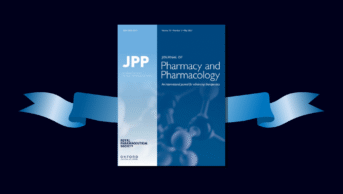In the past two years, there has been a wealth of impactful research advancing pharmacy practice, pharmacology and healthcare delivery. Here, I have reflected on the most cited papers from 2023 and 2024 across our Pharmaceutical Press journals: Journal of Pharmacy and Pharmacology (JPP), International Journal of Pharmacy Practice (IJPP), Journal of Pharmacy Health Services Research (JPHSR) and RPS Pharmacy and Pharmacology Reports (RPSPPR). Parastou Donyai, chief scientist at the Royal Pharmaceutical Society, has previously explained what citations are and what it means to be considered highly cited.

In this blog, I wanted to focus on the research methods used across these high impact studies over recent years. I believe there are at least eight methods. Have you used all of these methods, some, or none? I would love to hear from you about your research experience.
- Preclinical experimental studies both in vivo and in vitro: In 2023, a study on the pharmacokinetics of garcinol was published in RPSPPR and, in 2024, research on Schisandrin B and adjuvant-induced arthritis was published in JPP. These studies used animal models to evaluate therapeutic effects, measure biomarkers, molecular pathways and pharmacokinetic profiles, using advanced tools such as liquid chromatography-mass spectrometry, and examine oxidative stress, inflammatory mediators and signalling pathways, such as HIF-1α/VEGF;
- Survey-based studies: In 2023, research on pharmacists’ participation in ward rounds was published in IJPP. These studies often involve the development and dissemination of structured or semi-structured questionnaires, the collection of responses from targeted populations, such as pharmacists in clinical settings, and descriptive and inferential statistical analyses to interpret findings;
- Cross-sectional studies: A 2024 study on the impact of mental health conditions on diabetes care costs was published by Bounthavong et al. in JPHSR. Studies typically analyse healthcare datasets to assess the relationship between comorbid conditions and healthcare resource utilisation, using statistical tools, such as regression models, to explore associations and control for confounding variables;
- Systematic reviews and meta-analyses: In 2023, notable examples included studies on deprescribing outcomes in older adults and pharmacist-led pharmaceutical care through virtual platforms published in IJPP and JPHSR, respectively. In 2024, community pharmacists’ roles in travel health services was highlighted in IJPP. Also in 2024, the study of community pharmacists’ experiences in palliative care published in IJPP used systematic scoping review methodology. These studies typically involve comprehensive literature searches across multiple databases to synthesise evidence and identify knowledge gaps or patterns. Frameworks such as PRISMA are used to ensure transparency and rigour. Comprehensive reviews such as these also involve a critical appraisal of the included studies to assess their quality and bias;
- Narrative or literature reviews: In 2023, studies on the dysregulation of tyrosinase activity, flavonoids and mitochondrial potassium channels and colours, flavours and shapes in 3D-printed paediatric dosage forms were published in JPP and RPSPPR, respectively. In 2024, research on phloretin’s potential against diabetes appeared in JPP. These studies involve non-systematic searches and focus on synthesising the state of knowledge on specific themes and, in some cases, additional analysis to identify trends and categorise findings;
- Cost and resource utilisation studies: In 2023, research on treatment-related problems and asthma hospitalisation costs was published in JPHSR, while in 2024, studies on mental health and diabetes healthcare costs appeared in the same journal. These studies involved retrospective analyses of healthcare claims or electronic medical records and economic modelling to quantify costs associated with specific health conditions or interventions;
- Qualitative research: In 2024, research on the role of pharmacists’ provision of travel health services was published in IJPP. Qualitative studies typically involve interviews or focus groups with healthcare professionals and thematic analysis to explore experiences, roles and barriers.
The common characteristics across these methods include a multidisciplinary approach, integrating pharmacology, clinical practice and health economics. The use of advanced and/digital tools — such as mass spectrometry, big data analytics and software for systematic reviews — enhances precision and scalability. Additionally, there was a strong focus on practical relevance, with studies often aimed at influencing clinical guidelines, healthcare policies or therapeutic innovations. Although I have focused on the main method used in these studies, it is worth noting that some studies included multiple methods.
Strong methodological rigour supports the high impact and citation potential of these papers. Have you been involved in any of these research methods? Share your experiences and insights in the comments below.
You can learn more about research methods from the Royal Pharmaceutical Society (RPS)’s research and evaluation guides and the research e-learning modules for pharmacists and pharmacy technicians , developed by the RPS for the National Institute for Health and Care Research.
The RPS science and research team also provides continued support services to members across all career stages, including assistance with interviews and application guidance. Find out more here.


